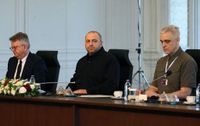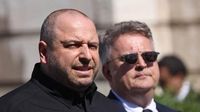On June 2, 2025, in Istanbul, a significant breakthrough was achieved in the ongoing conflict between Ukraine and Russia, as both sides agreed on a new prisoner of war (POW) exchange formula. This agreement, described as an "all-for-all" swap, targets two key categories of prisoners and marks a hopeful step forward amidst the protracted tensions between the two nations.
Ukraine’s Defense Minister Rustem Umierov, who led the Ukrainian delegation during the negotiations, announced that the two countries had agreed to an exchange focusing on seriously wounded and seriously ill prisoners of war, as well as young soldiers aged between 18 and 25 years. This agreement also includes a grim but important provision for the mutual return of the bodies of fallen soldiers, with a plan to exchange 6,000 bodies on each side.
Speaking at a press briefing, Umierov emphasized Ukraine’s firm stance on the release of all prisoners and the return of abducted children. He said, "We're insisting on the release of all prisoners and the return of abducted children. In the release of prisoners of war, we agreed to focus on categories rather than numbers." This approach aims to prioritize humanitarian concerns and streamline the exchange process, rather than getting bogged down in numerical quotas.
Deputy Chief of Ukraine’s Defense Intelligence, Major General Vadym Skibitskyi, echoed this sentiment, highlighting the progress made on the so-called "all-for-all" formula. He explained, "Today we have achieved new progress - the so-called ‘all for all’ formula. Today we have agreed on two categories that will be subject to return to their homeland, we have agreed on the mechanisms, and determined the preliminary dates for this exchange." Skibitskyi also acknowledged the complexity of the task ahead, noting that extensive verification processes will be necessary to ensure no prisoner is overlooked or forgotten.
The agreement was reached during a meeting that lasted just over an hour, marking the second round of negotiations between the Ukrainian and Russian delegations since their initial talks on May 16, 2025. The first round had resulted in a large-scale prisoner exchange in a 1,000-for-1,000 format, which was carried out gradually over several days. For example, on May 23, 390 Ukrainians, including servicemen and civilians, were released from Russian captivity, followed by further exchanges on May 24 and 25 involving hundreds more prisoners.
In addition to the prisoner exchange, the talks in Istanbul revealed for the first time Ukraine’s reception of Russia’s proposals for a ceasefire and an end to the war. Umierov stated, "Our teams will have a week to review the documents, after which we will be able to coordinate next steps." However, Moscow has yet to respond to Ukraine’s proposals, and the path toward peace remains uncertain.
Another critical aspect of the negotiations involved the fate of Ukrainian children who have been deported to Russia. Andriy Yermak, Head of the President’s Office, handed over a list of several hundred Ukrainian children requiring return to Russian representatives. Umierov confirmed this, saying Ukraine is awaiting action from Moscow on this humanitarian issue.
Looking ahead, Ukraine has proposed organizing a leader-level meeting, potentially involving other global leaders such as the President of the United States. Umierov stressed the importance of this initiative, saying, "We believe that further work between the delegations makes sense if it is aimed at preparing for a meeting between state leaders. We have proposed to the Russian side that a leader-level meeting should be held by the end of this month, between 20 and 30 June. This is very important for the negotiation process." Such a summit could provide a vital platform to address broader conflict resolution and peacebuilding efforts.
The talks in Istanbul also involved diplomatic coordination with European partners. Prior to meeting the Russian delegation, Ukraine’s First Deputy Foreign Minister Serhii Kyslytsia and delegation member Oleksandr Bevz met with representatives from Germany, Italy, and the United Kingdom, underscoring the international dimension of the conflict and the ongoing efforts to garner support for Ukraine.
Reflecting on the challenges ahead, Skibitskyi noted, "We have hard, hard work ahead of us, where we will need to do a lot of verification, define all categories, not lose anyone, not forget anyone. Therefore, we continue our work. And we will be successful." This cautious optimism captures the delicate balance of hope and realism that characterizes the current phase of negotiations.
Overall, the Istanbul agreement represents a meaningful, if tentative, step toward easing the human toll of the conflict. By focusing on vulnerable groups—seriously wounded prisoners and young soldiers—and addressing the sensitive issue of fallen soldiers’ remains, both sides have demonstrated a willingness to engage on humanitarian grounds despite the broader hostilities.
As the world watches, the coming weeks will be critical. The review of ceasefire proposals, the verification and implementation of the prisoner exchange, and the potential leader-level summit all hold the promise of shifting the trajectory of this devastating conflict. For now, the agreement reached in Istanbul offers a glimmer of progress amid years of strife, reminding all involved that even in the darkest times, dialogue and negotiation remain possible.





